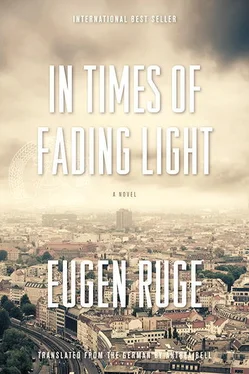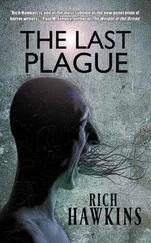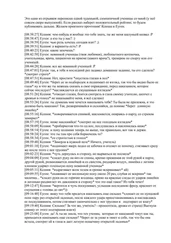A large drop of sauce formed on Kurt’s chin. Alexander felt a strong urge to hurt his father, to tear off a piece of paper towel and wipe the sauce roughly away from his face.
The drop quivered and fell.
Had it been yesterday? Or today? At some point in the last two days, when he was lying on the buffalo leather sofa (motionless, for some reason or other taking care not to touch the leather with his bare skin), at some point during that time the idea of killing Kurt had occurred to him. He had played out variants of the scene in his head: smothering Kurt with his pillow, or maybe—the perfect murder—serving him a tough steak. Like the steak on which he had nearly choked. And if Alexander, when Kurt went blue in the face, staggered about in the road and fell unconscious to the ground, if Alexander hadn’t instinctively turned him over to the stable position on his side, so that as a result the almost globular lump of meat, chewed to a gooey consistency, hadn’t rolled out of Kurt’s mouth along with his dentures, then Kurt would presumably be dead now, and Alexander would have been spared (at least) this last setback.
“Did you notice that I haven’t been to see you for a while?”
Kurt had started on the red cabbage now—some time ago he had reverted to the infantile habit of eating his meal in separate parts, first meat, then vegetables, then potatoes. Surprisingly, he had his fork back in his hand, and it was even the right way up. He went on shoveling red cabbage into his mouth.
Alexander repeated his question. “Did you notice that I haven’t been here to see you for a while?”
“Yes,” said Kurt.
“So you did notice, then. How long was it? A week, a month, a year?”
“Yes,” said Kurt.
“A year, then?” asked Alexander.
“Yes,” said Kurt.
Alexander laughed. And to him it really did feel like a year. Like another life, when the life that preceded it had been ended by a single banal sentence. “I’m sending you to Fröbelstrasse.”
That was all.
“Fröbelstrasse?”
“The hospital there.”
Only once he was outside did he think of asking the nurse whether that meant he ought to take pajamas and a toothbrush with him. And the nurse had gone back into the consulting room and asked if that meant the patient ought to take pajamas and a toothbrush with him. And the doctor had said yes, it did indeed mean the patient ought to take pajamas and a toothbrush to the hospital with him. And that was it.
Four weeks. Twenty-seven doctors (he’d been counting). Modern medicine.
The assistant doctor who looked like a high school kid in his last year, who had examined him in a crazy reception area where people severely sick with something or other were groaning behind screens, and who had explained the principles of diagnostics. The doctor with the ponytail (very nice man) who claimed that marathon runners don’t get sick. The woman radiologist who had asked whether, at his age, he was thinking of having more children. The surgeon with a name like a butcher, Fleischhauer. And of course the pockmarked Karajan look-alike, Dr. Koch the medical director.
Plus twenty-two more of them.
And probably another two dozen lab assistants who put the blood they’d taken from him into test tubes, investigated his urine, examined his tissues under microscopes, or put them in centrifugal devices of some kind. And all with the pitiful, the positively outrageous result, that Dr. Koch had summed up in a single word.
“Inoperable.”
So Dr. Koch had said. In his grating voice. With his pockmarked face. His Karajan hairstyle. Inoperable, he had said, rocking back and forth in his swivel chair, and the lenses of his glasses had flashed in time with his movements.
Kurt had finished the red cabbage. Was starting in on the potatoes: too dry. Alexander knew what would happen now if he didn’t put a glass of water in front of Kurt at once. The dry potatoes would stick in Kurt’s throat, he would have a noisy attack of hiccups, suggesting that he was about to bring up his entire stomach. Kurt could probably be choked to death on dry potatoes, too.
Kurt, funnily enough, was operable; Kurt had had three-quarters of his stomach removed. And with what stomach was left he ate as if he had been given an extra three-quarters of a stomach instead. Never mind what meal arrived, Kurt always cleared his plate. He had always cleared his plate in the past, too, thought Alexander. Whatever Irina put in front of him. He had eaten it up and praised it—excellent! Always the same praise, always the same “Thanks!” and “Excellent!” Only years later, after Irina’s death, when Alexander happened to cook for him now and then—only then did Alexander realize how humiliating that eternal “Thanks!” and “Excellent!” must have been for his mother, how it must have worn her down. You couldn’t accuse Kurt of anything. Indeed, he had never made demands, not even on Irina. If no one cooked for him, he would go to a restaurant or have a sandwich. And if someone did cook for him, he said thank you nicely. Then he took his afternoon nap. Then he went for his walk. Then he looked at his mail. Who could object to that? No one at all. That was exactly the point.
Kurt was dabbing up the last of the potato with his fingertips. Alexander handed him a napkin. Kurt actually wiped his mouth with it, folded the napkin again neatly, and put it beside his plate.
“Listen, Father,” said Alexander. “I’ve been in the hospital.”
Kurt shook his head. Alexander took his forearm and tried again, speaking with emphasis.
“I,” he said, pointing to himself, “have been in the hos-pi-tal! Understand?”
“Yes,” said Kurt, standing up.
“I’m not through yet,” said Alexander.
But Kurt did not react. Shuffled into the bedroom, still with only one slipper on, and took his pants down. Looked expectantly at Alexander.
“Your afternoon nap?”
“Yes,” said Kurt.
“Well, let’s change that diaper, then.”
Kurt shuffled into the bathroom. Alexander was just thinking that he had understood, but in the bathroom Kurt took his padded undershorts down a little way and pissed on the floor, his urine rising in a high arc.
“What do you think you’re doing?”
Kurt looked up in alarm, but he couldn’t stop pissing.
By the time Alexander had showered his father, put him to bed, and mopped the bathroom floor, his coffee was cold. He looked at the time: around two o’clock. The evening home health aide wouldn’t come until seven at the earliest. He wondered briefly whether to take the twenty-seven thousand marks from the wall safe and simply walk out with it. But he decided to wait. He wanted to do it in front of Kurt’s eyes. Wanted to explain to him, even if that was pointless. Wanted Kurt to say yes to what he was doing—even if “yes” was the only word he ever uttered now.
Alexander took his coffee into the living room. Now what? How could he pass the time? Once again he disliked himself for falling into the rhythm of Kurt’s days, and that dislike linked up of its own accord with the pronounced dislike he already felt for the room. Except that now he hadn’t been here for four weeks, it seemed even worse: blue curtains, blue wallpaper, all blue. Because blue had been the favorite color of Kurt’s last love… idiotic, at the age of seventy-eight. When Irina had hardly been in her grave for six months… even the napkins, even the candles were blue!
The pair of them had acted like high school kids for a year. Sending each other amorous postcards, wrapping the love tokens they ex-changed in blue paper, and then Kurt’s last love had probably noticed that his mind was beginning to go—and made off. Leaving behind what Alexander called “the blue casket.” A cold, blue world where no one lived anymore.
Читать дальше












